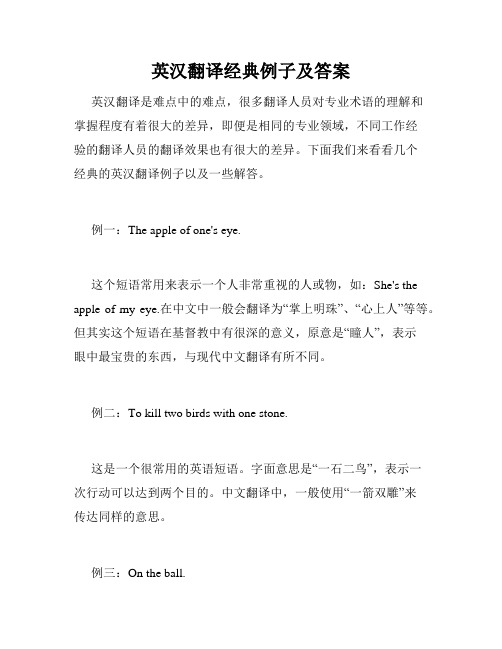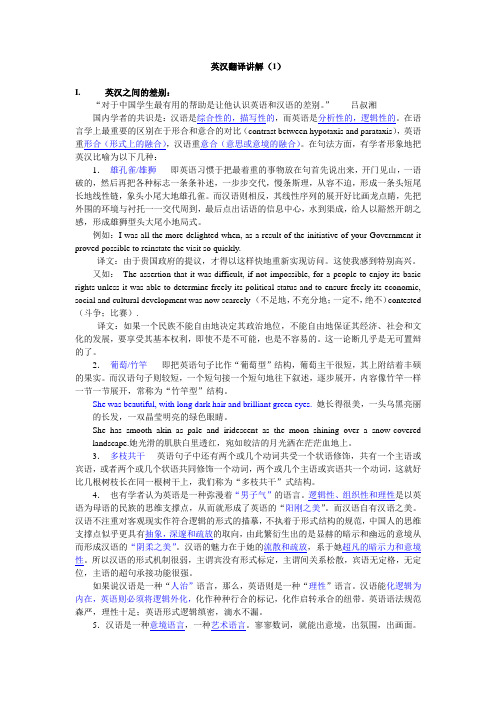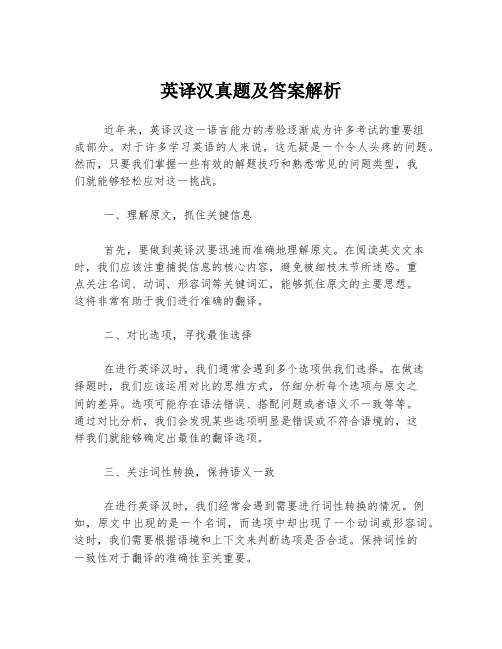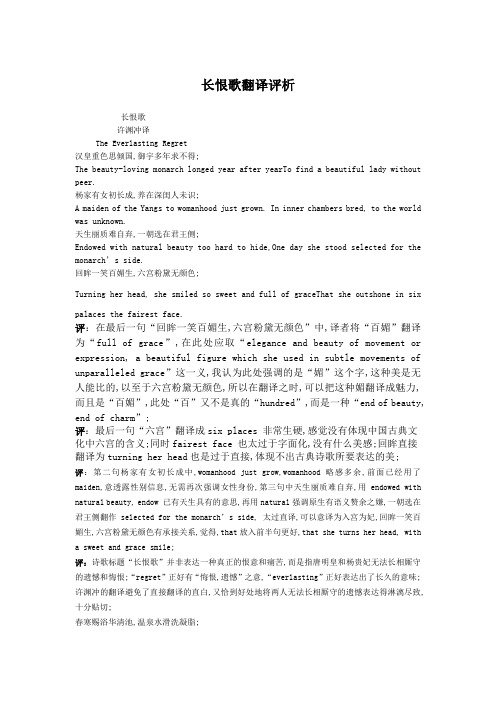英汉翻译评析(答案)
新英汉翻译教程英汉语言对比答案

语言的表达方式不仅与文化有着密切的关 系,而且与思维及逻辑方式有着密切的关系。 这种思维及逻辑方式的差异在语言表达方式上 的表现既存在于语篇的思路和结构上,也存在 于句子水平上。
小节结束
8 返回章重点 退出
3. 1英汉语言特征对比
Comparisons between English and Chinese Language Features
12
返回章重点 退出
【译文】现在这些伟人只是横七竖八地挤在一起,埋 在黄土中;他们在世之时,堂堂英国却不足以供他们 驰骋,如今却遵照经济的原则,他们只分得那么小的 一块土地,那么黑暗而又贫瘠的一个角落;他们曾企 图让声名占有世代人的思想,获得人人的敬羡。如今 他们的坟墓却千方百计地雕出种种装饰,只是为了吸 引游客偶然的一顾,免得在短短的几年中就把他们的 名字匆匆忘怀。看了这些,想到人生的虚空,我又几 乎忍不住要惨然一笑了。
3.1.4 英语语序变换多,汉语结构较固定
3.1.5 英语多用被动,汉语常用主动
课堂互动1
3. 2 英汉词汇表达对比
3.2.1 英语词汇含义多 3.2.2 英语词汇搭配多
3.2.3 英语词汇在句中的位置多
课堂互动2
3. 3 英汉句法结构对比
3.3.1 英汉句子结构的互换
A. 英语简单句可转换成汉语复合句
【译文】白星公司的班轮泰坦尼克号在1912年处女航中 因撞上冰山而沉没,船上1 300多名乘客遇难。此后关 于她的种种传说便成为各种刊物、电影以及诗歌、歌 曲的内容而广为流传。
小节结束
22
返回章重点 退出
3. 1. 5 英语多被动,汉语常用主动 英语重物称,常采用无生命词汇作主
语,所以多被动句,并且不指出动作的执 行者;汉语重人称,习惯用表示人或物的 词汇作主语,大都以主动句的形式出现。
英汉互译实践与技巧课后答案解析

英汉互译实践与技巧课后答案解析英汉互译实践与技巧课后答案UNIT1Make a comparison between the English word “send” and the corresponding Chinese character “送”, trying to have a thorough command of them.Send = 送1.Your luggage will be sent up very soon.你的行李很快就送过来了2.They have sent a wreath.他们送了一个花圈3.He was given a big send-off at the station.他在平台受到隆重的欢送4.They are now sending their children to college, too.他们也在送孩子上学Send = 送?1.Who send the letter?谁捎来的信2.Have you sent off the order?订单发出去了吗3.Please send him in.请叫他进来4.He sends words that he wouldn’t be coming.他带信来说,他不来了5.Could you send sb. to help us?你能派人来帮助我们吗6.Please send the goods by air.请用航空发货7.The shot sent the birds flying away.枪声惊飞了一群鸟8.Send for the doctor, please.请叫医生来送= send?1.送某人一本书give sb a book2.送礼present a gift to sb3.送信deliver a letler4.送客see a visitor out5.送行see sb off6.送雨伞bring sb a unbrellar7.送命lose one’s life8.送孩子上学take a child to school9.送某人回家escort somebody home10.将卫星送上天launch a satellite11.送葬take part in funeral procession12.送罪犯上法庭审判hand the criminal over to the court for trialUNIT21.Needing some light to see by, the burglar crossed the room with a light step to light thelight with the light green shade 盗贼为了穿过房间,必须借助光源的照射,于是他蹑手蹑足的点燃了一盏灯,然后借着微弱的绿光走出了屋子。
英汉翻译经典例子及答案

英汉翻译经典例子及答案英汉翻译是难点中的难点,很多翻译人员对专业术语的理解和掌握程度有着很大的差异,即便是相同的专业领域,不同工作经验的翻译人员的翻译效果也有很大的差异。
下面我们来看看几个经典的英汉翻译例子以及一些解答。
例一:The apple of one's eye.这个短语常用来表示一个人非常重视的人或物,如:She's the apple of my eye.在中文中一般会翻译为“掌上明珠”、“心上人”等等。
但其实这个短语在基督教中有很深的意义,原意是“瞳人”,表示眼中最宝贵的东西,与现代中文翻译有所不同。
例二:To kill two birds with one stone.这是一个很常用的英语短语。
字面意思是“一石二鸟”,表示一次行动可以达到两个目的。
中文翻译中,一般使用“一箭双雕”来传达同样的意思。
例三:On the ball.这个短语用来形容一个人具有很好的表现,特别是在工作方面。
在中文中,一般使用“做事精明”、“处理事情迅速”等词语来翻译。
例四:Break a leg.这是一个由演员之间互相祝福的短语,意为“好运”。
事实上,这个短语的起源并不是直接与成功有关的,而是与悲剧有关的,因为在戏剧中,演员的成功和悲剧往往紧密相连。
例五:Back to the drawing board.这个短语一般用来表示某个计划或者想法需要重头再来了。
在中文中,可以翻译为“重新开始计划”、“重新考虑计划”。
总结:以上是几个经典的英汉翻译例子。
我们可以看到,在英汉翻译中,尤其是涉及到口语和俚语的时候,翻译的成效往往很不一样,因此英汉翻译需要有很多的专业技巧和实战经验。
不过,我们可以总结出一些翻译的精要,如直接翻译字面意思并不一定完全准确,有时候需要根据上下文和文化背景进行适当的转换,这样可以让翻译更加贴切和生动。
英语翻译评析

英语翻译评析袁兆帆自动化1006班U2010137571.翻译原文Stopped at last! A clever blow. He is down upon the pavement;and the crowd eagerly gather round him, each new- comer jostling and struggling with the othersto catch a glimpse. 'Stand aside!' 'Give him a little air!' 'Nonsense!he don't deserve it.' 'Where's the gentleman?' 'Here he is,coming down the street.' 'Make room there for the gentleman!' 'Is this the boy,sir!' 'Yes.'Oliver lay,covered with mud and dust,and bleeding from the mouth,looking wildly round upon the heap of faces that surrounded him,when the old gentleman was officiously dragged and pushed into the circle by the foremost of the pursuers.'Yes,' said the gentleman,'I am afraid it is the boy.''Afraid!' murmured the crowd. 'That's a good 'un!''Poor fellow!' said the gentleman,'He has hurt himself.''I did that,sir,' said a great lubberly fellow,stepping forward;'and preciously I cut my knuckle agin' his mouth. I stopped him,sir.'The fellow touched his hat with a grin,expecting something for his pains;but,the old gentleman,eyeing him with an expression of dislike,look anxiously round,as if he contemplated running away himself,which it is very possible he might have attempted to do,and thus have afforded another chase,had not a police officer (who is generally the last person to arrive in such cases)at that moment made his way through the crowd,and seized Oliver by the collar.2.我的翻译总算是让他停下了,漂亮的一拳!他倒在了路上,周围的人们一拥而上把他围住了,每一个刚到的人都要挤进人群中瞧一眼,”给我让开!””让他好好踹口气””胡扯,他不值得去踹那口气””那位绅士在哪呢?””在那儿呢,正沿街走来呢””给他让条路!””是这个男孩吗?先生””没错”欧利佛躺在地上,身上全是泥和灰尘,嘴角还流着血,惊恐的向上望着围住他的无数面孔,这时,那位绅士被在最前头的追捕者推挤着进入了人圈之中.“没错”绅士说道”恐怕就是这孩子”“恐怕!?”人群之中开始议论了”真是好样的”“可怜的孩子!”绅士说道”他受伤了”“是我做的,先生”一个粗手大脚的男人走进了说,”我一拳打到他的脸上,我的手也破了,是我抓住了他,先生”那个男人露出了尴尬的微笑行了个礼,指望得到一点酬劳,但是绅士却摆着一张讨厌他的脸,他不安的四处张望,就仿佛他自己打算逃跑.他很有可能这么做,从而再次引起一场追捕,不过幸运的是一位警察在这个时候从人群中挤了进来(每到这种情况他通常都是最后一个到场的),把欧利佛的衣领一把抓住.3.翻译评析此段文章描述的是[雾都孤儿]中的一个场景,其中主要描述的有3个形象,一个是绅士,一个是欧利佛,还有那个将欧利佛一拳打倒的男人,此段虽然短,可是对语言有很多直接引用,例如”Give him a little air”,”poor fellow”等,像此处,如果不结合上下文,光看这两句话的话,我们肯定只会翻译成”给他一点空气”,”可怜的同事”,所以我们翻译的时候必须要联系上下文,不然文章的每句话单独拿出来可能都是没有问题的,可是合到一起去的时候,也许就完全不能理解到底是什么意思了.对这三个人的描写也各有不同,对绅士而言,更多的则是利用了语言描写,绅士说的话”yes”,”I am afraid it is the boy”,”poor fellow”都是仅有几个词,感觉这样用语言描写,能够刻画出这位绅士不愿意和追逐者还有献殷勤者多说一句话,体现了绅士对他们的厌恶,虽然通过绅士的表情或者心理描写当然也能把厌恶表现出来,可是还是语言描写最能使读者更强烈的感受到这种感觉.因此,当我们翻译的时候,需要把这几个句子翻译的冷一点.将绅士的那种情感从文字之中表达出来.然而对于欧利佛则不一样了,此间欧利佛是一直没有说话的,可是需要将欧利佛内心的恐惧,和他被打倒的惨状表达出来,便只能对他的状态,外观进行描写,例如” Oliver lay,covered with mud and dust,and bleeding from the mouth,looking wildly round upon the heap of faces that surrounded him”这均是对欧利佛的状态的描写,由他的惨状和恐惧让读者产生对他的可怜感.而对那个一拳将欧利佛打倒的男人来说,作者很明显的把那对绅士献殷勤求酬劳的嘴脸描述了出来, and preciously I cut my knuckle agin' his mouth. I stopped him,sir,这句话的中的I stopped him,如果我们自己看,确实很容易理解是这个男人停下了逃跑的男孩,可是如果我们直接就翻译成我停下了他,这样会感觉非常的突兀,并且中文中也没有这种说法.所以我翻译成了我抓住了他,这个样子更加符合中文的习惯一点,因此,我们翻译不仅仅要遵从原文,也需要符合我们自己的语言习惯才行,其中还有看热闹的人的一句That's a good 'un!,我觉得这句话我可是好好想了一会儿的.因为一眼看过去,我们肯定会觉得这是”那真是个好un啊”的意思.然后就会完全不知所以然了,但是结合上下文来看,绅士这个时候也不确定是不是这个男孩,他说了”恐怕”,围观的群众对此当然是感到惊讶,所以翻译成”真是好样的”就比较合适了,有点调侃的语气了.所以翻译也是要看语境的,即使同样的一句话,不同的语境下,翻译的意思就会大不相同,这文章也一直都是以一个旁观者的视角去写的,所以我们的在翻译的时候也要忠实于这一点,不能翻译的时候改变视角.然而本文的句式也是翻译之中要注意的点之一,例如Oliver lay,covered with mud and dust,and bleeding from the mouth,looking wildly round upon theheap of faces that surrounded him这句话,主句就是Oliver lay,而此外均是此主句的状语,翻译的时候必须注意不能干巴巴的翻译成,欧利佛躺着,被泥和灰包围,嘴里流着血…必须对其中的状语之间的连接,身上全是泥和灰尘,嘴角还流着血,此处的cover我们都知道是身上,所以译为身上都是泥和灰尘更好,否则则会很奇怪.其实,翻译这篇文章的时候,我不仅仅翻译了一遍,第一遍翻译的时候,翻译完了自己读的时候,总感觉句子和句子之间就仿佛我前文中写道的一样,好像都是一个句子一个句子,而并不是一段文章,所以第二遍的时候,对着自己的翻译和原文,将翻译的句子与句子之间加了一些东西,使得句子能够读起来比较流畅,使之成为一个段落.还有的甚至连句子都不是,例如I cut my knuckle agin' his mouth这句话,我第一遍的翻译就是我切了自己的手抵抗着她的嘴巴.一读就觉得完全不是那回事,后来根据理解将之翻译成为了我一拳打到他的脸上,我的手也破了,这样才变得符合了我们的语言习惯.从这次的翻译之中我觉得我的收获颇多,因为很多地方咱们读了原文之后都是能够理解的.可是要是想用自己的话翻译出来,并且翻译成一个句子那还是需要下很多功夫的,像我水平不够,就只有通过多次翻译的方法将自己的翻译完善,同时我觉得翻译是个很有意思的过程,就像用自己的话把读到的故事给讲出来一样,同样是一个故事,我们可以把他讲的非常吸引人,也可以讲的平淡无奇.而这全靠我们讲故事的人的翻译水平了.。
英汉翻译评析(附参考译文)

英汉翻译讲解(1)I.英汉之间的差别:“对于中国学生最有用的帮助是让他认识英语和汉语的差别。
”------吕叔湘国内学者的共识是:汉语是综合性的,描写性的,而英语是分析性的,逻辑性的。
在语言学上最重要的区别在于形合和意合的对比(contrast between hypotaxis and parataxis),英语重形合(形式上的融合),汉语重意合(意思或意境的融合)。
在句法方面,有学者形象地把英汉比喻为以下几种:1.雄孔雀/雄狮-----即英语习惯于把最着重的事物放在句首先说出来,开门见山,一语破的,然后再把各种标志一条条补述,一步步交代,慢条斯理,从容不迫,形成一条头短尾长地线性链,象头小尾大地雄孔雀。
而汉语则相反,其线性序列的展开好比画龙点睛,先把外围的环境与衬托一一交代周到,最后点出话语的信息中心,水到渠成,给人以豁然开朗之感,形成雄狮型头大尾小地局式。
例如:I was all the more delighted when, as a result of the initiative of your Government it proved possible to reinstate the visit so quickly.译文:由于贵国政府的提议,才得以这样快地重新实现访问。
这使我感到特别高兴。
又如:The assertion that it was difficult, if not impossible, for a people to enjoy its basic rights unless it was able to determine freely its political status and to ensure freely its economic, social and cultural development was now scarcely (不足地,不充分地;一定不,绝不)contested (斗争;比赛).译文:如果一个民族不能自由地决定其政治地位,不能自由地保证其经济、社会和文化的发展,要享受其基本权利,即使不是不可能,也是不容易的。
英译汉真题及答案解析

英译汉真题及答案解析近年来,英译汉这一语言能力的考验逐渐成为许多考试的重要组成部分。
对于许多学习英语的人来说,这无疑是一个令人头疼的问题。
然而,只要我们掌握一些有效的解题技巧和熟悉常见的问题类型,我们就能够轻松应对这一挑战。
一、理解原文,抓住关键信息首先,要做到英译汉要迅速而准确地理解原文。
在阅读英文文本时,我们应该注重捕捉信息的核心内容,避免被细枝末节所迷惑。
重点关注名词、动词、形容词等关键词汇,能够抓住原文的主要思想。
这将非常有助于我们进行准确的翻译。
二、对比选项,寻找最佳选择在进行英译汉时,我们通常会遇到多个选项供我们选择。
在做选择题时,我们应该运用对比的思维方式,仔细分析每个选项与原文之间的差异。
选项可能存在语法错误、搭配问题或者语义不一致等等。
通过对比分析,我们会发现某些选项明显是错误或不符合语境的,这样我们就能够确定出最佳的翻译选项。
三、关注词性转换,保持语义一致在进行英译汉时,我们经常会遇到需要进行词性转换的情况。
例如,原文中出现的是一个名词,而选项中却出现了一个动词或形容词。
这时,我们需要根据语境和上下文来判断选项是否合适。
保持词性的一致性对于翻译的准确性至关重要。
四、理解上下文,掌握句与句之间的逻辑关系英译汉不仅需要对原文进行准确的理解,还需要理解句子与句子之间的逻辑关系。
我们需要考虑上下文中的相关信息,从而进行合理而连贯的翻译。
有时,一些选项可能在语义上是正确的,但在上下文中却不合适,因为它们与前后句之间的逻辑关系不符。
因此,在进行英译汉时,我们不能孤立地看待每个句子,而应该将其放在整个上下文中考虑。
五、积累词汇和常用表达方式要提高英译汉的能力,积累词汇和常用表达方式是必不可少的。
我们可以通过阅读和观看英语影视剧来增加我们的词汇量。
此外,我们还可以积累一些常用的翻译表达,如转述、解释、归纳总结等,这些表达方式可以帮助我们更准确地翻译原文。
综上所述,英译汉真题可以考查我们的语言理解能力和翻译技巧。
英汉翻译评析

长恨歌翻译评析长恨歌许渊冲译The Everlasting Regret汉皇重色思倾国,御宇多年求不得;The beauty-loving monarch longed year after yearTo find a beautiful lady without peer.杨家有女初长成,养在深闺人未识;A maiden of the Yangs to womanhood just grown. In inner chambers bred, to the world was unknown.天生丽质难自弃,一朝选在君王侧;Endowed with natural beauty too hard to hide,One day she stood selected for the monarch’s side.回眸一笑百媚生,六宫粉黛无颜色;Turning her head, she smiled so sweet and full of graceThat she outshone in sixpalaces the fairest face.评:在最后一句“回眸一笑百媚生,六宫粉黛无颜色”中,译者将“百媚”翻译为“full of grace”,在此处应取“elegance and beauty of movement or expression, a beautiful figure which she used in subtle movements of unparalleled grace”这一义,我认为此处强调的是“媚”这个字,这种美是无人能比的,以至于六宫粉黛无颜色,所以在翻译之时,可以把这种媚翻译成魅力,而且是“百媚”,此处“百”又不是真的“hundred”,而是一种“end of beauty, end of charm”;评:最后一句“六宫”翻译成six places 非常生硬,感觉没有体现中国古典文化中六宫的含义;同时fairest face 也太过于字面化,没有什么美感;回眸直接翻译为turning her head也是过于直接,体现不出古典诗歌所要表达的美;评:第二句杨家有女初长成中,womanhood just grow,womanhood 略感多余,前面已经用了maiden,意透露性别信息,无需再次强调女性身份,第三句中天生丽质难自弃,用endowed with natural beauty, endow 已有天生具有的意思,再用natural强调原生有语义赘余之嫌,一朝选在君王侧翻作selected for the monarch’s side, 太过直译,可以意译为入宫为妃,回眸一笑百媚生,六宫粉黛无颜色有承接关系,觉得,that放入前半句更好,that she turns her head, with a sweet and grace smile;评:诗歌标题“长恨歌”并非表达一种真正的恨意和痛苦,而是指唐明皇和杨贵妃无法长相厮守的遗憾和悔恨;“regret”正好有“悔恨,遗憾”之意,“everlasting”正好表达出了长久的意味;许渊冲的翻译避免了直接翻译的直白,又恰到好处地将两人无法长相厮守的遗憾表达得淋漓尽致,十分贴切;春寒赐浴华清池,温泉水滑洗凝脂;She bathed in glassy water of warm-fountain pool,Which laved and smoothed her creamy skin when spring was cool.许One cold spring day she was orderedTo bathe in the Huaqing Palace baths.The warm water slipped downHer glistening jade-like body. 杨评:在这句的翻译中,先看杨宪益翻译的版本,他用了order一词,觉得不妥,没有把获宠赏赐的幸福感觉翻译出来;许渊冲把华清池译成glassy water of warm-fountain pool,我觉得这样翻得更好,直接把华清池的特点说了出来,更让人明白诗的本意;云鬓花颜金步摇,芙蓉帐暖度春宵;Flowerlike face and cloudlike hair, golden-headdressed,In lotus-flower curtain she spent the night blessed.许Her hair like a cloud,Her face like a flower,杨评:两者的译本都注重了形美,句式工整,但许的版本还采取了压韵的手法headdressed和blessed,压尾韵;春宵苦短日高起,从此君王不早朝;She slept till sun rose high, for the blessed night was short,From then on the monarch held no longer morning court.许They took their pleasure in the spring night.Regretting only the spring nights were too short;Rising only when the sun was high;He stopped attending court sessionsIn the early morning.杨评:两者的翻译均都到位,杨的版本把诗的意思更直白清晰地表达了出来,而许的版本更为委婉精简;本人更喜欢杨的版本,杨的译本体现了更多皇帝与杨贵妃的互动情趣,更明显地表现出两人美好的爱情;。
翻译理论英汉对比版 附带习题和部分答案(适合考试准备)

复习提纲:What is translation and its essence?(什么是翻译和其本质?)Translation is the expression in one language of what has been expressed in another language, preserving semantic and stylistic equivalence. It is a kind of cross-language, cross-culture and cross society language activity. Its essence is the meaning explanation and transformation翻译是用一种语言把另一种语言所表达的思维内容准确完整地重新表达出来的,跨语言,跨交际,跨社会的语言活动。
其本质是释意,意义的转换。
types of translation(翻译的分类)From the stand point of signs: intralingual translation,interlingual translation and intersemiotic translation从涉及的符号来看:语内翻译,语际翻译,符际翻译From the stand point of the extent to which translation is done:full translation,partial translation and translation plus editing从翻译的方法来看:全译,摘译,编译From the stand point of way in translation is carried out:written interlingual translation,oral interlingual translation and machine translation从翻译的手段来看:笔译,口译,机器翻译From the stand point of the languages involved:native language into foreign language and foreign language into native language从source language and target language的角度:本族语译外族语,外族语译本族语From the stand point of the subject matter:professional translation(juristic and science writings),literary translation(novel,poem and drama)and general translation从翻译的题材来看:专业翻译(法律,科技文献),文学翻译(诗歌,散文,戏剧),一般性翻译(各种应用文和新闻报道)procedure of translation(翻译的过程)accurate comprehension,adequate expression and testing(理解,表达,校核)comprehension contains grammatical analysis,semantic analysis,stylistic analysis and discourse analysis理解分为:语法分析,意义分析,风格分析和语篇分析adequate expression:literal translation,translation by ideas and both of them表达分为直译,意译和两者并用criteria of translation(翻译的标准)Alexander F. Tytler(亚历山大F. 泰特勒)(1)A translation should give a complete transcript of the ideas of the original work(译作应完全复写出原作的思想)(2)The style and manner of writing should be of the same character as that of the original(译作的风格和手法应和原作属于同一性质)(3)A translation should have all the ease of the original composition.(译作应具备原作具有的通顺)Popular western criteria:equivalent value,equivalent effect and equivalent function(西方流行标准:等值,等效,功能对等)similarity in function and correspondence in meaning(功能相似,语义相符)Fedorov(费德罗夫)The exactness of translation means the exact rendering of the thought and content of the original and performs the same rhetorical function as the original. (翻译等值理论)Eugene Nida (尤金奈达)functional equivalence(功能对等)The crucial problem of translation is often stated in terms of conflict between formal correspondence and functional equivalence.Yan Fu(严复)faithfulness, expressiveness and elegance(信达雅)译事三难,信,达,雅,求其信已大难矣,顾信矣不达,虽译犹不译也,则尚达焉。
- 1、下载文档前请自行甄别文档内容的完整性,平台不提供额外的编辑、内容补充、找答案等附加服务。
- 2、"仅部分预览"的文档,不可在线预览部分如存在完整性等问题,可反馈申请退款(可完整预览的文档不适用该条件!)。
- 3、如文档侵犯您的权益,请联系客服反馈,我们会尽快为您处理(人工客服工作时间:9:00-18:30)。
Commentaries on the Version of “一个女人是这样衰老的”一个女人是这样衰老的SV:How a Woman Ages/A Woman’s Aging/A Woman Fades Thus/What causes a Woman to Grow Old/The Way in Which a woman is Aging/How a Woman Gets OldRV: The Way Woman Withers点评:Rhetorical Device: distillation and aesthetic hightlights of language, either Chinese or English/The successful employment of alliteration(头韵)1.二十岁的时候,我穿着一条背心式牛仔裙在校园里走来走去,一说话就脸红。
三十岁的我穿着名牌套装,坐在办公桌前,满脸冷酷地对下属说:“这么愚蠢的问题你也敢问?也不先打个草稿。
”SV: At the age of twenty, I walked about on the campus, wearing a vestlike jean skirt. My face would turn red whenever I speak. After I have turned thirty, I am seated in front of a bureau, in a suit of famous brand, reproaching a subordinate coldly “How dare you ask such a stupid question? Why didn’t you make a draft first?”RV: At the age of twenty, wearing a jeans jumper, I moved about on the campus, my face blushing the moment I had the inclination to make anutterance. At the age of thirty, I, wearing a famous-brand suit and a cold look, reproach my subordinate bluntly, “How can you go so far as to raise such a silly, mindless question?”点评:Zeugma (轭式修饰法):a figure of speech in which a single word, usually a verb or adjective, is syntactically related to two or more words, though having a different sense in relation to each. More examples:The senator picked up his hat and his courage/She possessed two false teeth and a sympathetic heart/ He lost the game and his temper.2.二十岁的时候,从图书馆借的是《莎士比亚全集》、《一个青年艺术家的自画像》和《尤里西斯》。
三十岁之后,床头摆的是《跟庄密笈》、《ELLE》和《经理人的个人魅力》.SV: At the age of twenty, The Collected Works of Shakespeare, The Portrait of an Artist as a Y oung Man, and Ulysses were borrowed from the library. After thirty, Strategy of Speculation on Stocks, ELLE and Manager’s Personal Charm were put on the bedside.RV: At the age of twenty, I borrowed books from the library like Shakespeare’s Complete Works, A Portrait of the Artist as a Y oung Man, Ulysses. After thirty, on my bedside, lie such books and magazines as The Recipe on Stocks, Elle and Manager’s Charm.点评:Syntactically(依照句法地), aesthetic value goes to Eng-Weightness in English, which is not the case with Chinese. For example:Gone are the days when I was young. VS. The days when I was young are gone.Word came that bribery行贿has sent him to prison. VS. Word that bribery has sent him to prison came.3.二十岁的暑假,在家乡的大街上偶遇自己的暗恋对象,听说他考上了研究生,被他的进步所打击,心如刀绞,想到这辈子终于不能出色得让他看我一眼,不禁怅然泪下。
三十岁之后,到处打听那里可以花钱买个MBA.SV: At 20, during a summer holiday I encountered my beloved one on the street of my hometown. I heard he was admitted to be a graduate. I was struck by his advance. I couldn’t help shedding tears in my extreme grief.I thought that for this life I could never achieve much to let him see me ina new light. After 30, I inquire everywhere where to purchase an MBA certificate.RV: At the age of twenty, I ran into the young man whom I loved in private in the street of my hometown. Upon hearing that he had been enrolled as a graduate, I was virtually dealt a heavy blow believing reluctantly so painful a fact that I could never do well enough to win his favor, bitter tears streaming down my cheeks. After thirty, I busy myself here and there, inquiring where I could by an MBA diploma.点评:Aesthetically(审美地)speaking, English appreciates sentence possessing a short main clause, with many words, phrases and clausesattached to it, something like a cluster of grapes, while Chinese favors sentence structure resembling bamboo, on segment after another.4.二十岁的时候,随时随地向人透露我的年龄,答得比问的还快。
三十岁之后,最恨别人问年龄,你要是非问不可,你猜啊。
SV: At the age of twenty, I was always ready to disclose my age on all occasions and could not wait to speak out the answer until the inquirer finished his words. After I have turned thirty, I hate any inquiry about my age. If you insist, have a guess.RV: At the age of twenty, I was so ready to reveal my age, telling people about my age frequently before they inquired. After thirty, age became almost a taboo to me. If somebody is so nosy, I respond, “Guess.”点评:English is a language of metaphor, leaving no stone unturned in exploiting the metaphorical meaning, or rather the connotative (转义的) meaning, of very single word, while Chinese language is heavily denotation(本义)-dependent.5.二十岁的时候,一心想和体育系、美术系的男生约会。
三十岁后,我简直认为自己当年是白痴。
SV: When in my twenties, I was only willing to date boys from sports or art department. After thirty, I even thought I had been an idiot before. RV: At the age of twenty, I did long to date with the boys from either physical education, or the art department. After thirty, it seems so unbelievable that I once idiotically possessed that thought.点评:Lexically(词汇地)speaking, part of the aesthetic value goes to flexible word formation in English which dwarfs Chinese6.二十岁的时候,有书店必须逛,有书必买。
